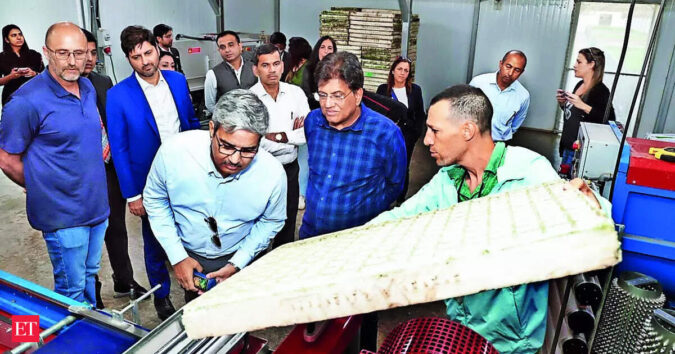“India, with its vast customer base, is a major potential market for us. We’re currently in discussions with Tata Energy about a possible collaboration,” says CEO Yaron Shenhav.
With technology and innovation emerging as key pillars in the newly-revived India-Israel Free Trade Agreement (FTA) negotiations – launched on November 20 with the signing of the terms of reference – startups like SolCold, along with many other lab-to-market innovators, may step into the spotlight.
Commerce and industry minister Piyush Goyal, who launched the FTA negotiations with Israel on Thursday, says New Delhi is eager to collaborate with Tel Aviv to strengthen India’s own startup ecosystem.
“We are looking at a deep partnership with Israel, which has one startup for every thousand people in their population. India aspires to become the startup capital of the world in the years ahead,” he said.
The minister added that there is tremendous enthusiasm among Israeli startups and innovators to work with India – a country that offers both scale and future opportunity. He also noted that a key component of the FTA discussions will be a dedicated startup exchange programme.According to a report published in The Times of Israel on July 1, 2025, investments in Israeli startups surged to a three-year high in the first half of 2025, despite the country’s ongoing conflicts with Hamas and Iran.Israeli startups raised more than $9 billion in private capital across 365 funding rounds during the first six months of the year, a 54% increase compared with the same period last year. The report added that this marks the strongest half-year performance for Israeli tech funding in three years.
“Israeli startups have thrived largely due to two key factors – knowledge and ambition,” says SolCold’s Shenhav. “Founders here have the audacity to challenge established norms.”
Meanwhile, Indian companies are also exploring collaborations with Israeli firms.
Jagadeesh Sunkad, marketing and collaboration officer at Bengaluru-based Zentron Labs, is one such visitor seeking partnerships.
“We manufacture machines that sort apples, oranges, and other fruits based on their colour, size, and weight. Israel could be a strong market for us, provided we find the right partner,” he says.
(The reporter is in Tel Aviv and Jerusalem at the invitation of Ficci)
